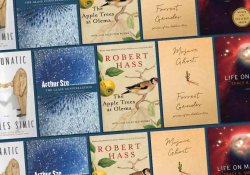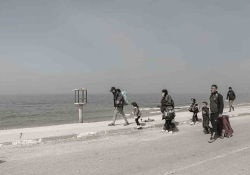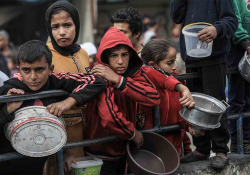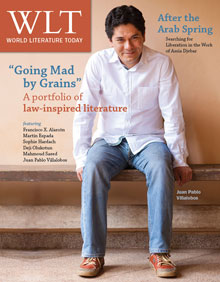“Going Mad by Grains” Reflections on Law and Literature
“If the law permeates our lives before we are born, reaching even into the womb, so too do stories, guaranteeing that law and literature will remain intimate bedfellows in the years to come.” Deji Olukotun, PEN American Center’s Freedom to Write Fellow, introduces our special section on law and literature.

“It’s being ground to bits in a slow mill; it’s being roasted at a slow fire; it’s being stung to death by single bees; it’s being drowned by drops; it’s going mad by grains.” This was Charles Dickens’s colorful description of a legal case in Bleak House, a novel that so excited the popular imagination that it led to the reform of the Chancery Courts that plagued nineteenth-century England. Although an extreme example of the influence of literature upon the law, great authors from Fyodor Dostoevsky to Chinua Achebe have written works in which the law serves a central role in the narrative.
Serious academic study of the interplay between law and literature exploded in the 1980s, when scholars began to systematically probe reflections of the law in literature, and also the opposite, reflections of literature in the law. Lawyers applied such tools of literary criticism as semiotics to judicial opinions. Literary critics in turn analyzed the ordering effect of the law upon narratives.
Today, the law-and-literature movement continues to deepen and splinter into more specialized areas such as social justice. Lynn Hunt, a professor at UCLA, studied the effect of French epistolary novels like Richardson’s Pamela on the discourse of human rights in the eighteenth century, a time when torture was as much a theatrical spectacle as a punishment. Similarly, in his work Human Rights, Inc., Joseph Slaughter highlights the role of the bildungsroman in promoting human rights, especially when the legal system has failed to uphold them. These studies are concerned in part with the ability of literature to induce what Martha Nussbaum has called “empathic identification,” spurring a reader to act.
While law and literature as a field is arguably an academic study, a rich body of literature exists that centers on legal themes. Legal thrillers, such as those by John Grisham, continue to fill the racks at airport bookstores and tie highly technical areas of the law to a pacy plot. Readers familiar with this magazine’s International Crime & Mystery column will recognize the importance of the law in hard-boiled thrillers and crime fiction, and how the author’s choice of protagonist (a cop, a mobster, or a turncoat) will affect the narrative based on their relationship to the law (inside, outside, both, respectively). Literature is also read and written by those punished for breaking the law. For example, blogger Dibussi Tande has identified a thriving tradition of prison literature in Cameroon by imprisoned dissidents and activists.
There are two areas of the law that have a significant effect on writers themselves. Free-expression principles are enshrined in human rights instruments throughout the world and protect writers from being persecuted for their expression; this is the work of my organization, PEN, which has been defending writers for over ninety years, as well as numerous other organizations working both on- and offline to protect expression. In 2012 alone, PEN is advocating on behalf of nearly 700 writers, from Azerbaijan to Uzbekistan.
A second area in which the law directly affects writers is in intellectual property, and specifically copyright. Copyright enables writers to profit from their work by granting them a limited monopoly for their labors, subject to a few defenses. But we now know that copyright can also stifle creativity when wielded like a hammer; witness the dangerous provisions that were narrowly turned down with the Stop Online Piracy Act, which would have shut down numerous lawful websites with no meaningful appeal procedure, and the rise of Creative Commons, which has striven to provide some certainty to those wishing to borrow and remix the expression of others.
In the Internet era, other legal issues have come to the fore that also affect writers, such as online censorship, surveillance and privacy, and the interplay between technology companies and human rights. As these threats evolve, so too has literature grown to meet them. For example, authors Tatyana Tolstaya and Vladimir Sorokin have written best-selling dystopian novels within an increasingly authoritarian Russia.
One interesting issue is whether lawyers themselves can create quality works of literature. The general rule is that lawyers learn to write persuasively and logically in order to zealously advocate for their clients. If you apply this stilted mode of writing to the nuanced rhythms required of fine prose, it seems unlikely that lawyers will produce stories which endure as great works of literature. (As this paragraph, written using the legal IRAC method, demonstrates—see sidebar.)
Writers, motivated by an exploration of ambiguity and an embrace of tension, and also concerned, at least, in part, with the human condition, might similarly struggle to create stories that truly reflect the subtleties and rigors of legal discourse—and might possibly, or even intentionally, misrepresent the facts of a case and fundamentals of grammar in the furtherance of storytelling. In other words, to create something special. (As this paragraph, throwing IRAC and grammar to the wind, flails.)
These may be unanswerable questions. But we do know that the law itself, particularly in repressive societies, can inspire great works of literature, as Zimbabwean-born lawyer, writer, and PEN president Peter Godwin explained to me over coffee: “When you have a fundamental fissure right down the middle of society, it provides this astonishing inspiration to your cadre of artists and writers. It feeds this burning passion to write about issues in a way that is more than pedestrian. Journalism doesn’t cover it. There’s this extra dimension that literature brings, an element of legacy and durability.”
Truly global studies within the law-and-literature movement that incorporate a diversity of voices across cultures and geographies are harder to find. Most studies are written in English, and are concerned with common law systems in the US and Great Britain. This excludes, for the most part, civil law traditions in francophone countries and hybrid legal systems such as Cameroon or South Africa, which contain a hodgepodge of customary law, Roman Dutch law, common law, and civil law.
These omissions make WLT’s thematic issue all the more important. The international voices contained in this volume were asked to send stories and poems about the laws that most inspire or provoke them—and their responses are both entertaining and deeply moving.
After 9/11, counterterrorism operations enjoyed a privileged status in the US and around the world, and torture was regularly used to gather intelligence—despite numerous international instruments to prevent it. In Mahmoud Saeed’s haunting piece “The Lizards’ Colony” (page 30), a translator of Iraqi descent arrives to work in a high-security prison and is raped within the first few hours. She is then asked to translate for a suspected terrorist who was swept up in a post-9/11 dragnet, and who has been so ruined by repeated interrogations that he can only repeat the same meaningless phrase again and again. After trying earnestly to communicate across Arabic dialects, the translator inadvertently becomes complicit in his torture; the suspect doesn’t provide any actionable intelligence, so the interrogators feel he is holding something back and must be tortured more.
In Sophie Hardach’s humorous piece “Anyone Have Any Idea What Jesus Wrote Here?” (page 42), an expatriate author in Peru discovers that her local bookseller has been selling a pirated version of her own book. Afraid of being prosecuted by the copyright police, the bookseller makes a few creative changes to the ending, whereupon it becomes a runaway best-seller. The author considered the original pirated copy to be slightly flattering, but the new alterations to the book are far more invasive and troubling, plunging her into writer’s block.
In “The Prisoners of the Past” (online edition), a work by South African writer Deena Padayachee, the theme is not the alteration of books but tacit censorship by public institutions. A book banned during Apartheid serves as the narrational voice in this creative and satirical piece. In the post-Apartheid era, the book still finds itself institutionally banned by librarians who have hidden it from the shelves. As a would-be reader hunts for copies of the book in the library system, we discover the racist structural impediments embedded in book-buying and library cataloging.
Writing from Spain, Juan Pablo Villalobos’s “Immoral Acts” (page 48) is a brilliant examination of the selective application, and denial of, the law and due process. The text is a police report that describes a young couple who are caught embracing behind a neighborhood sandwich shop. As each erotic (and amusing) element of the crime is unveiled—and “the unmistakable enjoyment that the crime caused both of them”—we gradually discover that the couple have been in a long-term relationship in a deeply religious community, and that the primary witness is an unreliable peeping Tom. Yet when the two lovers protest their innocence and complain about corruption and more dangerous problems in the neighborhood, they are charged with further crimes. Their real crime is to have become involved in a legal process in the first place, for which there is no viable escape or hope for fairness.
Martín Espada’s essay (page 52) charts the distinguished history of lawyer-poets, especially Edgar Lee Masters, a lawyer who wrote the best-selling Spoon River Anthology in 1915 before abandoning his practice. Espada himself upholds this tradition with two poems that portray his experiences as a tenant lawyer for clients living in shabby, substandard apartments who nonetheless owe their landlords money and rent (pages 54 and 57). As the law fails one woman whose utilities have been shut off, Espada conspires with an electrician to become “thieves of light” by restoring the tenant’s power. In the second poem, he portrays the opposite, as a translator wrestles with how to inform a tenant that a judge has ordered her evicted from her rat-infested home.
But is it possible for poetry to have an impact on unfolding social issues? Poets from Manama (Ayat al-Qurmezi) to Beijing (Liao Yiwu and Nobel laureate Liu Xiaobo) to Wall Street (various Occupy poets) have harnessed the energy of upheaval in their work. Francisco X. Alarcón’s innovative project invites poets to write on a Facebook wall to challenge Arizona’s controversial recent immigration law, which allows government authorities to demand papers of those suspected of being undocumented immigrants—leading to fears of racial profiling. Alarcón imagines a series of stereotypical questions for likely targets in his poem: if you “wear airy / guayaberas / outdoors in the heat” or “still pray / in Spanish,” he warns, “be aware you / may be under / reasonable suspicion.”
Each selection in this issue shows the complexity of the relationship between law and literature, whether from the perspective of a translator, a writer, a book, a policeman, or a tenant lawyer. If the law permeates our lives before we are born, reaching even into the womb, so too do stories, guaranteeing that law and literature will remain intimate bedfellows in the years to come.
Brooklyn











